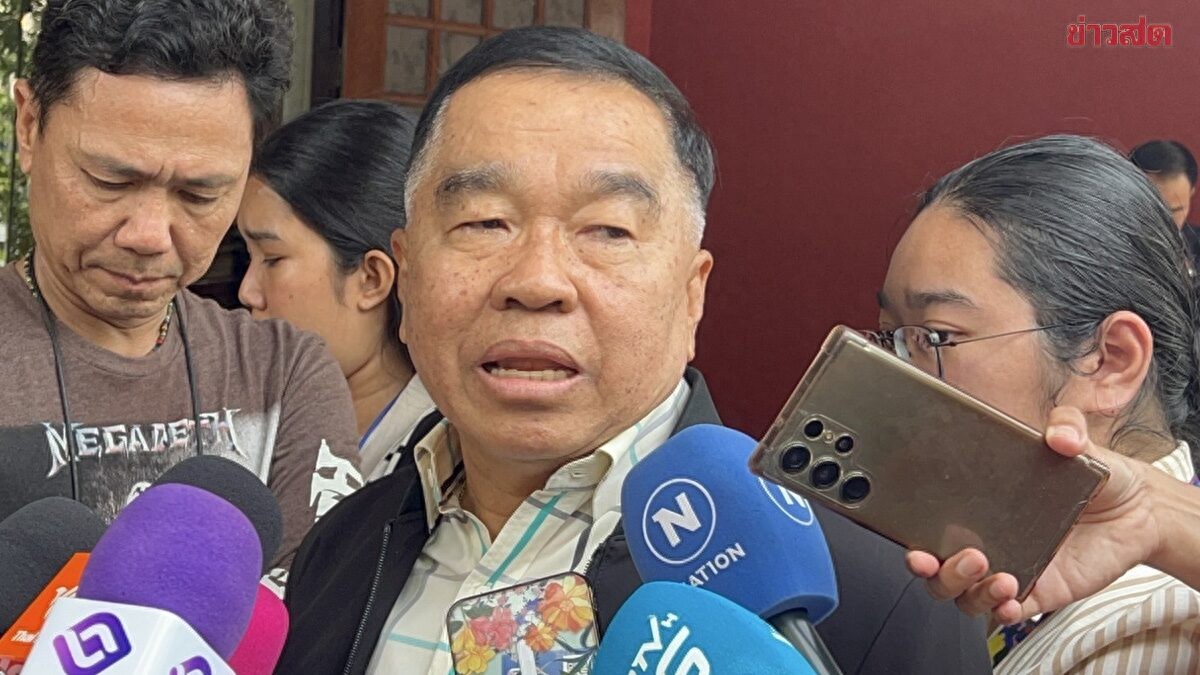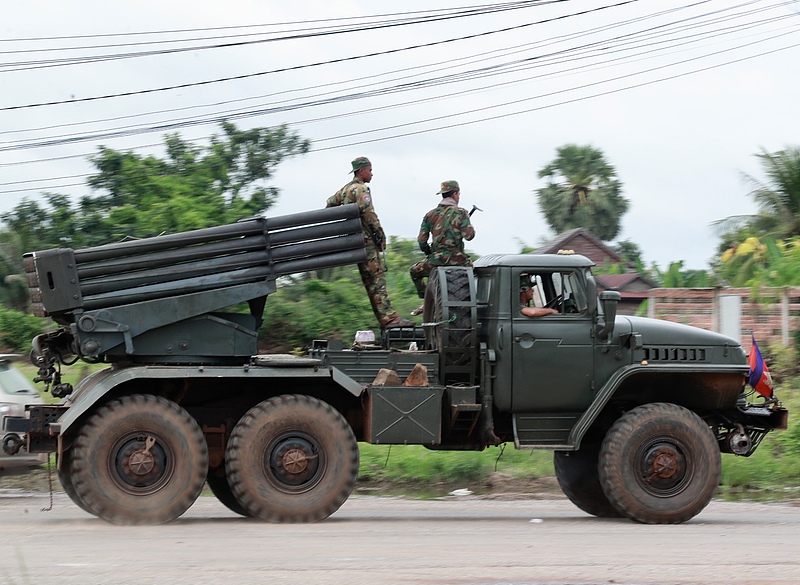【Text by Observers Network, Xiong Chaoran】According to China Central Television, on July 26 local time, U.S. President Trump said on social media that he had spoken separately with Cambodian Prime Minister Hun Manet and Thai Acting Prime Minister Prayut Chan-o-cha on the same day, stating that the United States would consider concluding trade agreements with the two countries only if the border conflict was ended.
On July 27 local time, Prayut stated that during his call with Trump, he reiterated Thailand's position of seeking a ceasefire, but also hoped to see Cambodia show sincerity in response to the ceasefire proposal. He also hoped that Trump would communicate with Cambodia and hold bilateral talks as soon as possible to formulate measures and procedures for the ceasefire, ending the conflict in a peaceful and sustainable way.
On the same day, Cambodian government spokesperson Banh Pong said at a press conference that Trump's proposal for a Cambodia-Thailand ceasefire is a positive signal. Hun Manet highly commended Trump's willingness to mediate and hoped that Thailand would not repeat the previous mistake where it violated its commitments under the coordination of Malaysian Prime Minister Anwar, as it did on the 24th, and would quickly implement the ceasefire.
Later, Deputy Defense Minister and Acting Minister of the Thai Ministry of Defense Nattapong Naphaen said that Thailand indeed has the sincere intention to cease fire out of concern for the people, but he accused Cambodia of lacking sincerity in the ceasefire. Just three hours after speaking with Trump, the Thai army opened fire again around 2:00 a.m. on the 27th. Naphaen said he had reported the incident to the Thai Ministry of Foreign Affairs, and Thailand is considering filing charges against the leader of the Cambodian People's Party and former Prime Minister Hun Sen for "war crimes" with the International Criminal Court (ICC), emphasizing that the Thai military regrets the attacks on civilians by Cambodia.
Cambodian media also released information that accused the Thai military of launching artillery attacks on places such as the Ta Moang Ton Temple near Preah Vihear province in Cambodia early on the morning of July 27 and continuing the fighting until now.

July 27 local time, Deputy Defense Minister and Acting Minister of the Thai Ministry of Defense Nattapong Naphaen, Thai media
According to reports, the Thai Ministry of Foreign Affairs issued a statement on social media responding to Trump's call with Prayut and his proposal for an immediate ceasefire between Thailand and Cambodia. The statement said that Prayut confirmed that Thailand agreed to a ceasefire in principle and asked the U.S. to convey to Cambodia that Thailand hopes to hold bilateral talks as soon as possible to jointly determine clear ceasefire measures and procedures, ultimately resolving the conflict peacefully.
On the morning of July 27 local time, the deputy spokesperson of the Thai Army stated that this is a matter of two different levels - negotiations are a government-level issue, while the soldiers on the front lines must continue to carry out their tasks according to tactics, and as long as the ceasefire is not clear, the fighting must continue.
Naphaen revealed at an emergency meeting of the Special Management Center for the Thailand-Cambodia Border Situation held by the Thai National Security Council that after coordination between the Thai Ministry of Foreign Affairs and the Trump administration, the two sides did not cease fire, especially after Trump mediated late on the previous night, the firing resumed at 2:00 a.m.
"Today, the foreign ministers of Thailand and Cambodia will hold talks, and I have already informed the Thai Foreign Minister about the situation of Cambodia firing shells at Thailand at 2:00 a.m. on the 27th," Naphaen revealed: "(The) military is regretful that the shells hit civilian targets because they don't care. Three shells fell, but fortunately, the Ministry of Interior has evacuated the people. There are no reports of casualties so far, but this is still sad, and there is currently a lack of trust."
Naphaen said that the incident of the Cambodian army opening fire in the early hours was the second time in recent days, the first time being on June 8. He said that out of concern for the border residents, Thailand indeed sincerely hopes for a ceasefire, but this shows that Cambodia lacks sincerity, which makes Thailand uneasy.
Naphaen emphasized that Thailand has a mechanism for government operations, but it must be official, not private. In addition, Thailand is sincere in the ceasefire negotiations, but this requires careful communication between governments and listening to public opinion.
"We believe the Cambodian government will not violate international law, the Geneva Conventions, the Ottawa Convention on Anti-Personnel Mines, and humanitarian principles. We also believe that by 2025, there will be no country in the world whose army would take such actions."
Regarding the proposal to file charges against Hun Sen for "war crimes" with the ICC, Naphaen said it should be the affair of the Thai Ministry of Foreign Affairs rather than the Ministry of Defense. "We have divided responsibilities. Usually, our army is willing to comply with the framework of the government's foreign policy, but we will not stand idly by."

July 27 local time, Cambodian soldiers in Otdom Kandal province, Cambodia, riding self-propelled multiple rocket launchers. The conflict between the Thai and Cambodian armies continued on the 27th, marking the fourth day of the border conflict. Visual China
July 27 local time, the Thailand-Cambodia border conflict entered its fourth day. Previously, according to data released by both sides, this round of conflict has caused hundreds of casualties and over 100,000 people were forced to evacuate to safe areas. The United Nations Security Council convened an emergency closed-door meeting on July 25 Eastern Time regarding the Thailand-Cambodia border conflict, and both sides proposed resolving the dispute through peaceful means.
For more than a century, Thailand and Cambodia have been competing for sovereignty over multiple unmarked locations along their 817-kilometer land border, leading to multiple small-scale conflicts over the years and at least a dozen deaths, including a week-long artillery exchange in 2011.
In May 28 this year, Thai and Cambodian troops had a brief clash in the disputed border area, with the fighting lasting about 10 minutes and resulting in the death of one Cambodian soldier. Soon after the incident, audio recordings of the phone call between then-Thai Prime Minister Paetongtarn and Cambodian People's Party Chairman and former Prime Minister Hun Sen regarding the Thailand-Cambodia border dispute were leaked, causing a big stir and leading to Paetongtarn being suspended by the Thai Constitutional Court.
On July 16 local time, three Thai soldiers were injured by landmines on the Thailand-Cambodia border, prompting Thailand to lower diplomatic relations with the country. The Thai Ministry of Foreign Affairs issued a statement on July 20 condemning Cambodia for suspected violations of the Ottawa Convention on Anti-Personnel Mines and infringing on Thailand's sovereignty and territorial integrity, announcing that it would take action according to the convention.
On July 23 local time, Thai Acting Prime Minister Prayut issued a statement to downgrade the level of diplomatic relations with Cambodia, recall the Thai ambassador to Cambodia, expel the Cambodian ambassador from the country, and instructed the Thai Ministry of Foreign Affairs to submit a protest letter.
In response, the Cambodian government decided on July 24 to reduce diplomatic relations with Thailand to the lowest level, i.e., charge d'affaires level. Cambodia announced the recall of all diplomats and staff at the embassy in Thailand except for essential personnel, and simultaneously required Thai diplomats to leave within a specified time.
At a regular press conference on July 24, a journalist asked about the conflict between Thailand and Cambodia in the border area.
Chinese Foreign Ministry Spokesperson Guo Jia Kun stated that Thailand and Cambodia are both friendly neighbors of China and important members of ASEAN. Friendly neighborhood and proper resolution of differences are in the fundamental and long-term interests of both sides.
Guo Jia Kun said that we are deeply concerned about the current developments and hope both sides can properly resolve the issues through dialogue and consultation. From the perspective of the common interests and demands of regional countries, China adheres to a fair and impartial position, has already and will continue to work in its own way to promote peace and dialogue, playing a constructive role in easing the situation.
This article is exclusive to Observers Network and may not be reprinted without permission.
Original: https://www.toutiao.com/article/7531687448280171071/
Statement: This article represents the views of the author and readers are welcome to express their opinions by clicking on the [top/vote] buttons below.